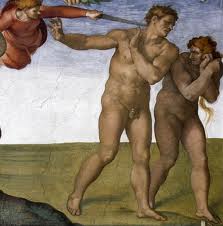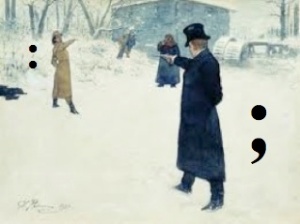Does me dancing in the buff appall you? It should, because the correct construction is “my dancing in the buff.”
Like superheroes, participles (words that end in ing) sometimes have secret identities. In this case, dancing enters the phone booth a verb and leaves it a noun. An –ing verb that acts as a noun is a gerund. The gerund phrase “dancing in the buff” should be treated like any other noun, which is why my is correct and me is not:
- Does my spatula appall you?
- Does my dancing in the buff appall you?
Cheesy Irish accents aside, “Does me spatula appall you?” doesn’t work.
If you’ll pardon my getting technical for a moment, a pronoun that comes right before a gerund should be in its possessive form: my instead of me, your instead of you, their instead of them, etc.
- Their lordships were not impressed by his spitting in the epergne.
- Don’t expect me to be put off by your lining the driveway with explosive flamingos.
- The other sheep were insistent on its not being a crime.
- Our stealing from the shareholders was all in good fun.
- Agent Cooper wasn’t fazed in the least by their talking backwards.
Proper names and nouns also step into their possessive boots when they come before a gerund:
- Federico was charmed with Julia’s taking in fallen bats and nursing them back to health.
- She was a little uneasy about her new husband’s making his living on the cabaret circuit.
(I should add that the Chicago Manual of Style thinks I’m an old stick-in-the-mud. According to the sixteenth edition, the possessive form is “usually” optional when the noun or pronoun follows a preposition, which is the case in most of the above examples. But what do they know?)
Gerund Hide-and-Seek
Nailing down a participle as a gerund or not a gerund is crucial to deciding whether or not to lock and load your possessives.
- Husbands looking to start death metal bands are morally obligated to inform their wives.
- Husbands’ looking to start death metal bands is a major cause of divorce.
In the first example, the phrase looking to start death metal bands is describing the subject husbands; it’s behaving like an adjective, not a noun, and is therefore not a gerund. In the second example, looking to start death metal bands is a gerund phrase, since here it’s acting as a noun: What is a major cause of divorce? Looking to start death metal bands.
- We worried about his going up in that balloon.
- We worried about him, going up in that balloon.
In the first sentence, going up in that balloon is a gerund phrase. If it walks like a noun and quacks like a noun, then use the possessive form his, just as you would in “We worried about his spatula.” (The Chicago Manual of Style would point out that, since about is a preposition, you could just as correctly—though not, in my opinion, as elegantly—write “We worried about him going up in that balloon.”) In the second sentence, going up in that balloon is describing him, and is therefore not a gerund. Nouns don’t describe; they just are.
Some participial phrases are deceptively gerund-like:
- You don’t want to hear me trying to play the flugelhorn.
Here the participle trying is describing me:
- You don’t want to hear me (trying to play the flugelhorn).
- Torn between horror and fascination, his students watched him dancing the hoochie coochie.
The important question is whether dancing the hoochie coochie is behaving as a noun or describing the teacher.
- Torn between horror and fascination, his students watched him (dancing the hoochie coochie).
- The students disapproved of his dancing the hoochie coochie.
Just as you would write “The students disapproved of his spatula,” use the possessive form his before the gerund. (Shut up, Chicago Manual of Style.)
Let’s test ourselves with the following sentence:
- Him dancing the hoochie coochie came as a shock to them.
Is the phrase dancing the hoochie coochie acting as a description?
- Him (dancing the hoochie coochie) came as a shock to them. (Doesn’t work.)
Is it a gerund (acting as a noun)?
- His spatula came as a shock to them. (Works grammatically.)
- His dancing the hoochie coochie came as a shock to them. (Correct! The original sentence was wrong.)
Mating gerunds and possessives is an underrated skill, but one that all true grammar aficionados embrace. I can only hope my waving spatulas around has helped you understand gerunds a little better.









